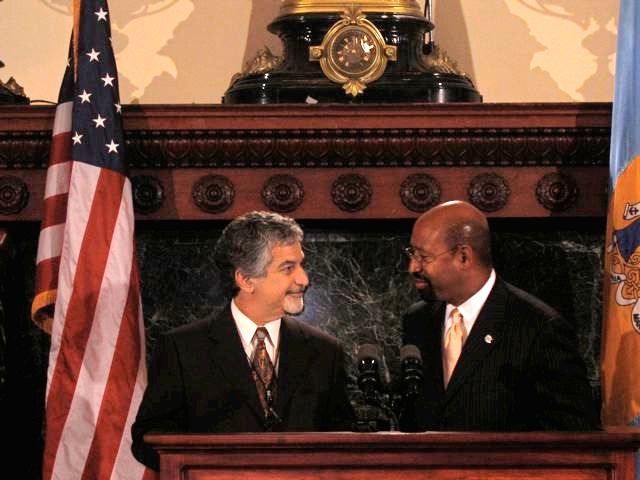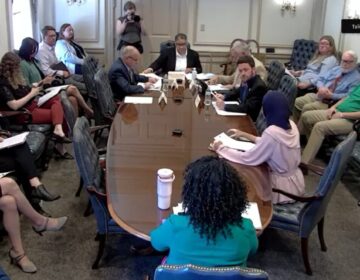Capital program, budget gets PCPC approval

Mar. 03
By Thomas J. Walsh
For PlanPhilly
The Philadelphia City Planning Commission unanimously adopted the city’s new six-year capital program and budget in a special session on Tuesday, after an outline of the plan by deputy planning director Gary Jastrzab.
The capital program and budget, for fiscal years 2010 through 2015, calls for $495 million in general obligation bond debt. But it will likely be amended – perhaps heavily – as details of the federal stimulus package wend their way through the system and administrators realize in full the kind of additional and supplemental funds they will have to work with. Jastrzab and City Budget Director Steve Agostini, who was on hand to answer questions, estimate that an amended plan will be ready by the end of March.
“Capital planning is more and more important to what we’re doing,” said Commission Chairman Andy Altman, deputy mayor for planning and commerce. “This year has been extraordinary in that the Budget Office and the Finance Office” – under Agostini and Rob Dubow, respectively – “have very much looked to and involved the Planning Commission … in the capital improvement program.”
“The Planning Commission has done, over the years, a lot of solid and good work on the city’s capital program,” Altman continued. The goal of the Nutter administration, he said, is “a real partnership” to “put the Planning Commission in a central role,” as dictated by its charter. And that will include not only the city capital priorities, but also the potential Federal funds that are likely to come.
Jastrzab said that according to their charter, the Planning Commission is required to give a recommendation on the annual capital program and budget to the mayor within 120 days of the end of the fiscal year. Tuesday was their drop-dead date, he said, adding, “So, thanks for being here.” Once the mayor approves it, the proposal is sent to City Council for hearings.
The six-year capital program is the city’s plan for investing in its public buildings (such as the “quad-plex” of four Center City municipal office structures, including City Hall), community facilities and physical infrastructure. But it also focuses on less quantitative measures, like improvements to neighborhoods and quality-of-life issues, while supporting “numerous other municipal government priorities.” Examples are projects promoting the city’s public safety initiatives, education, economic development, sustainability, customer service, and ethics and accountability.
“To bring all city facilities up to good repair would cost about $1 billion,” Jastrzab said. Given the city’s current budget woes, “It will be a huge effort in the coming years.”
Key planning considerations, Jastrzab said, ideally maintain consistency with departmental facility studies and master plans – leveraging funds from other government funds and resulting in operating-cost savings and the preservation of the city’s “unique resources.”
Sources of funds include new city tax-supported funds (general obligation bonds floated by the city) and “carried-forward spending authorization” from previous years (also tax-supported, or repaid from the city’s general tax revenues), along with revolving funds and federal, state and private monies. The sources of all funds total some $7.8 billion, with spending over time on 76 projects, or 300 to 350 “sub-projects.”
The new six-year plan is due to be posted at PhilaPlanning.org today or tomorrow www.philaplanning.org/plans/rcpgm10.pdf, Jastrzab said. But as stated during the meeting, departmental totals could end up very different than those approved by the Commission on Tuesday, due to the federal stimulus package signed into law by President Obama last week.
“We, along with every other city, were operating blind,” said Planning Commission Executive Director Alan Greenberger, in arriving at the charter-driven required totals. After the impact of the stimulus package is made clear, he explained, “we’ll need to fold this into a revision of this capital budget.”
Jastrzab said that key projects, by initiative, include “network infrastructure stabilization and enhancements,” energy-efficiency improvements and citywide environmental remediation efforts.
Commissioners present for the meeting: Altman, Greenberger, Peggy Van Belle, Nancy Rogo Trainer (principal at Venturi, Scott Brown & Associates), Natalia Olson de Savyckyj (transportation planner, Zoning Code Commissioner), Bernard Lee (partner at Wolf, Block, Schorr and Solis-Cohen LLP), Commission Vice Chairman Joe Syrnick (president and CEO, Schuylkill River Development Corp.), Anuj Gupta (deputy director of performance management, co-chair of PhillyStat).
Contact the reporter at thomaswalsh1@gmail.com.
WHYY is your source for fact-based, in-depth journalism and information. As a nonprofit organization, we rely on financial support from readers like you. Please give today.






